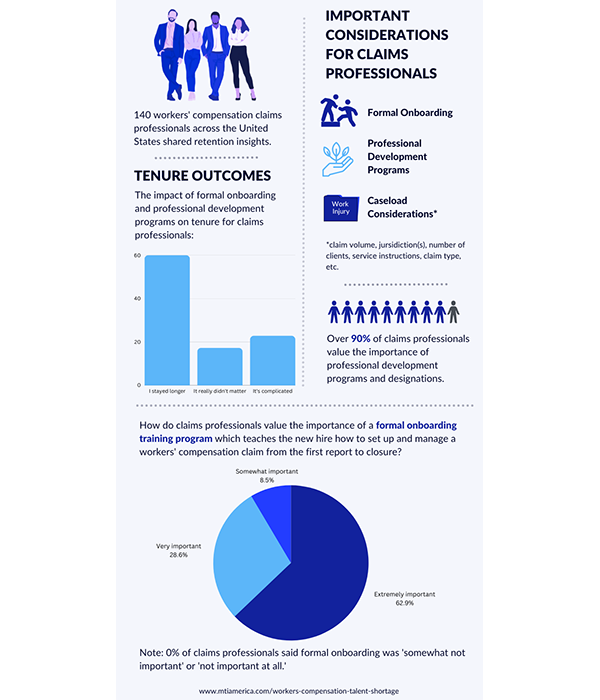Sponsored: MTI America
The Talent Shortage: Claims Professionals Weigh In

The insurance industry faces a talent shortage, and companies are struggling to attract and retain claims professionals. In this article, we’ll take a quick look at how the industry got here and, most importantly, dive into the invaluable feedback collected from 140 claims professionals in the industry’s largest scholarly exploratory study focused on workers’ compensation.
Contributing Factors Behind the Talent Shortage

Nikki Jackson, MBA, CPCU, ARM, CDMS, Vice President of Strategy and Marketing at MTI
There are several factors behind the talent shortage itself, but the primary contributing factors include employment rates, working age, COVID-19 and the Great Resignation.
Over the past several decades, the employment rate for prime-age U.S. adults has been dropping, from 64.3% in 1999 to 60.4% in 2018. There are many plausible contributing factors for this, like increased disability benefits (SSDI, VADC), higher minimum wages and increased incarceration rates, as well as shifts in the labor market like import competition and the use of automation.
In addition, the working-age population (15 to 64 years old) decreased in 2020 for the first time in the nation’s history. The major contributing factors to this decline, according to Nikki Jackson, vice president of strategy and marketing at MTI, included a slower birthrate, a fall in immigration, a retiring baby boomer generation and the many deaths caused by COVID-19.
Lastly, the COVID-19 pandemic triggered unprecedented furloughs and mass layoffs to reduce workforce-related expenses in 2020, while the Great Resignation phenomenon disrupted the talent pool as a staggering 2.9% of the U.S. population quit their jobs.
140 Claims Professionals Provide Retention Feedback
Understanding the talent shortage is very real, we set out to understand a) how to attract new talent to the insurance industry, and b) how to retain claims professionals. MTI America recently released a summary of the study’s focus on talent recruitment, so we’ll focus on the claims professional portion of the study.
Three questions guided the investigation:
1. How do claims professionals value the importance of a formal onboarding training program that teaches the new hire how to set up and manage a workers’ compensation claim from the first report to closure?
Of the 140 workers’ compensation claims professionals that participated in this study, over 90% felt that a formal onboarding program was somewhat or extremely important. Some participants (less than 9%) were neutral about the topic, but none of the participants felt formal onboarding was ‘somewhat not important’ or ‘not important at all.’
2. Do claims professionals have higher loyalty if employers offer professional development programs?
When asked about the importance of professional development programs, over 90% of the 140 claims professionals surveyed indicated that professional development programs were somewhat or extremely important. Over half of the participants had 10 or more years of claims experience, and 20% had six to nine years of claims experience. When asked “If engaged in a professional development program, how does/did it impact your loyalty to your employer?” almost 90% indicated a greater degree of loyalty to their employer.
3. When reflecting on their career, do claims professionals feel their tenure is impacted by formal onboarding and professional development programs?
The claims professionals in this study were asked if formal onboarding and professional development programs impacted their tenure, and 60% of participants said “Yes, I stayed with my employer longer.” Seventeen percent felt formal onboarding and professional development programs had no impact, and the remainder (23%) responded, “It is complicated; yes and no.”
Recommendations
“Workers’ compensation claims professionals have a unique set of employee-retention strategies, which should include formal onboarding and professional development programs,” said Jackson. “Traditional retention strategies like recognition, rewards, compensation, vacation and work-life balance are all important, but claims professionals have additional factors such as caseloads, jurisdictions handled, client service instructions etc. that require a different set of retention strategy considerations.”
As is evident from this study, formal onboarding programs are important to workers’ compensation claims professionals and should aim to teach the new hire how to set up and manage a claim from the first report of injury to claim closure.
A common onboarding experience starts on the day of the employment offer and continues for 24 to 54 weeks after the employee’s start date, with the first week or two being the most training-intensive. Many large carriers and TPAs offer entry-level claims professional roles. In this role, the new hire may receive organizational training for three to five days before attending a two-week “claims college.” It’s important to acknowledge that experienced claims professionals also require formal onboarding to help them become acclimated with an organization and their role.
In addition to onboarding, this study demonstrated that claims professionals value professional development programs and feel an increased sense of loyalty when involved in such programs. These professional development programs should focus on improving performance in their current roles and prepare the claims professional for future roles within the organization.
After the professional development program, a survey should be distributed to collect feedback. The feedback may be used during performance discussions and coaching sessions and to evaluate overall morale and loyalty.
Encouraging claims professionals to secure designations and providing the support to secure the same is also an excellent way to increase retention.
Findings Summary
The claims professional survey found a formal onboarding program focused on how to set up a claim from the first report of injury to claim closure was an important retention strategy. The claims professional survey also found that professional development programs resulted in higher employee loyalty.

“When combined, formal onboarding and professional development programs resulted in a longer tenure with the employer,” Jackson explained. “Organizations that implement or develop the attraction and retention strategies found important in this study will have a higher likelihood of combating the talent shortage in the workers’ compensation industry.”
Future Research
During the literature review, it was evident that there was very limited academic research exploring the impacts of formal onboarding programs for claims professionals in the workers’ compensation industry. It would be helpful for claims organizations to share their new hire onboarding data with the industry to establish a set of benchmarks. Internally, organizations should collect feedback from their new hires at determined intervals after the employee’s start date (i.e. at 30, 60 and 90 days) to see what was done well and identify areas of opportunity during the onboarding process.
The academic research exploring the impacts of professional development programs for claims professionals in the workers’ compensation industry was also very limited during the literature review for this study. As with onboarding, it would be helpful for claims organizations to share their professional development data with the industry to establish a set of benchmarks. Employers are also encouraged to survey claims professionals to see what types of professional development categories interest them the most. It would prove beneficial for organizations to secure feedback from those who have completed professional development programs internally to discover areas of excellence and opportunity.
Lastly, members of the workers’ compensation industry should develop their partnerships with schools who offer risk and insurance training and/or degrees, as well as search for talent in untapped talent pools. For example, organizations should stop competing for talent and broaden their talent pools to include individuals from other industries, veterans, retired police officers, individuals with disabilities, those who are returning to the workforce after caring for children, and so on.
To learn more, please visit: https://www.mtiamerica.com.
![]()
This article was produced by the R&I Brand Studio, a unit of the advertising department of Risk & Insurance, in collaboration with MTI America. The editorial staff of Risk & Insurance had no role in its preparation.










